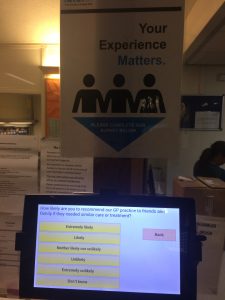
They say you should never start with an apology – but let’s break that rule: apologies in advance to anyone reading this who does actually suffer from obsessive compulsive disorder (OCD). This post is not intended to trivialise a serious mental health condition but Obsessive Customer Experience Disorder (OCXD) seems like a good way of characterising my own (hopefully) healthy interest in all things related to customer experience. It’s possible that if you’ve got this far you may also be concerned that you have a similar condition so here’s five questions to ask yourself to check whether you also might also be showing some of the symptoms.
1. Difficulty relaxing when you’re out?
You’re out for the evening with a partner/friends, let’s say for a meal in a nice restaurant, and despite the company and the fine setting you still can’t relax. Likely explanation is that the server is too early/too late taking your order or that the gap between courses is unacceptably long. It’s possible that you may just have a thing about restaurants but if you find a similar sensation occurring when you don’t get served well in a bar, a supermarket or other outlet you are showing signs of OCXD – it’s not just that you’re unhappy with the experience, you’re unhappy because you know that the underlying conditions in the business you’re a customer of are not in place to deliver a great experience and that’s a missed opportunity.
2. Find online experiences stressful?
Stressful online experiences could be a symptom of a more general technophobia but, like the examples above, you’ll find yourself getting stressed during a poor online experience because you know that the provider of the experience hasn’t thought the design through properly and the resultant journey is bumpy, almost certainly throwing off other less persistent customers along the way.
3. IVR is a source of fascination?
Most people hate interactive voice response (IVR) systems that require them to select from menus and push buttons to get into a queue to speak to an adviser who may or may not be able to help them. You’ll share their pain, for sure, but a sure sign of OXCD is the need to go through the IVR several times just to see how many different routes you can take or wilfully pressing the wrong button to see if the adviser you finally get put through to can still help you…
4. Feel obliged to respond to opinion surveys?

Once you’ve navigated the IVR to your heart’s content you get put through to an adviser who, at the end of your transaction asks if you want to be surveyed after the call. Of course you do, nothing would give you greater pleasure, even if you know they might not ask the right questions and you will inevitability be asked if on a scale of 1-10 you would recommend the service to a friend or a member of your family.
Email requests for your opinion are hard to turn down too and as for a walk-by opportunity (as in my GP’s surgery recently), well, that’s just too hard to resist.
5. Give unsolicited feedback?
‘Your feedback is important to us’ they say – you bet it is! So important that you’re going to give them some more, whether they like it or not. You find yourself commending or criticising the person who just served you in a shop or asking the heating engineer how their company is becoming more customer-focused.
And if you find yourself frustrated that the recipients of your critique don’t fall down on their knees in gratitude well, that’s the kind of attitude that those with this little-understood condition encounter day in and day out.
How did you score?
A score of 5/5 indicates that you may have what might be called full-blown OCXD. It’s manageable and, apart from the occasional irritation of your nearest and dearest, is unlikely to cause lasting harm. Lower scores mean you have some of the symptoms and may be able to maintain a healthy passion for customer excellence without too much disturbance to your daily life. A score of zero means that you may have immunity, or possibly be so laid-back you might seek an alternative career as a lifestyle guru.
Is it contagious?
As far as pseudo-science is aware you can’t contract OCXD through physical contact however it’s definitely possible to develop symptoms through being in the company of others with the condition. In an environment with colleagues and co-workers who are similarly obsessed with customer experience, you’ll most likely find your symptoms are alleviated.
(It’s also likely that it could be hereditary: it’s likely that I have inherited a certain finicky attitude to these things from my restaurateur/hotelier father who could get very grumpy if his vodka martini wasn’t prepared just so – and despite donning a tux during dinner service, 007 he was not.)
Although the study of OXCD is limited (possibly just to this article) it’s thought that this condition, if managed correctly, could be to the benefit of businesses and their customers and therefore its spread should be encouraged.